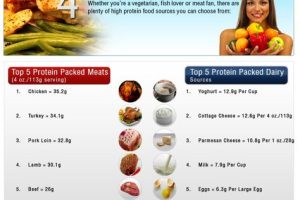The Ultimate Protein Guide for Optimal Health and Wellness

Introduction: Understanding the Role of Protein in the Body
Importance of Protein in a Balanced Diet
Protein is often dubbed the building block of life, and for good reason. This macronutrient plays a vital role in countless bodily functions. From repairing tissue to producing enzymes and hormones, the importance of protein in a balanced diet cannot be overstated. Imagine for a moment a construction site. The workers and building materials are essential for erecting a sturdy structure. Similarly, protein functions as the workers, using amino acids (the building materials) to create and repair the tissues in our bodies. Without enough protein, the body struggles to maintain its integrity and health. The dietary recommendations suggest that protein should make up a certain percentage of our daily caloric intake. For most adults, this is approximately 10-35%. Consuming an adequate amount of protein can lead to several significant benefits:
- The Ultimate Protein Guide for Optimal Health and Wellness
- Introduction: Understanding the Role of Protein in the Body
- Importance of Protein in a Balanced Diet
- Different Sources of Protein
- Protein Requirements for Different Age Groups
- Protein Needs for Children and Adolescents
- Protein Intake for Adults and Seniors
- Health Benefits of Consuming Adequate Protein
- Muscle Repair and Growth
- Weight Management and Metabolism
- The Best Protein-Rich Foods to Include in Your Diet
- Animal-Based Protein Sources
- Plant-Based Protein Sources
- Protein Supplements: Types and Considerations
- Whey Protein vs. Plant-Based Protein Powders
- Choosing the Right Protein Supplement for Your Needs
- Supports muscle health and growth
- Aids in recovery from injury
- Manages weight by promoting a feeling of fullness
- Regulates body processes through hormone production
Different Sources of Protein
When it comes to incorporating protein into our diets, the good news is there are numerous sources available that cater to various preferences. Two primary categories exist: animal-based and plant-based proteins. Animal-Based Protein Sources
- Meat (chicken, beef, lamb)
- Fish (salmon, tuna, mackerel)
- Dairy products (milk, yogurt, cheese)
- Eggs
These sources are often considered complete proteins, meaning they contain all nine essential amino acids our bodies can’t produce on their own. Plant-Based Protein Sources
- Legumes (lentils, beans, chickpeas)
- Nuts and seeds (almonds, chia seeds, hemp seeds)
- Whole grains (quinoa, farro, barley)
- Soy products (tofu, tempeh, edamame)
While many plant-based proteins may be incomplete, combining different sources can provide a complementary amino acid profile, ensuring all dietary needs are met. With such a variety available, anyone can find a way to meet their protein needs, whether they are carnivorous, vegetarian, or vegan. Embracing these diverse protein sources can lead not only to a healthier diet but also to a more flavorful culinary experience.
Protein Requirements for Different Age Groups
Protein Needs for Children and Adolescents
As children grow and develop, their protein needs significantly increase. During these formative years, protein plays a crucial role in supporting growth, building muscle, and developing a strong immune system. It’s essential to ensure that children receive adequate protein, as it lays the foundation for their overall health. For children aged 1 to 3 years, the recommended daily intake is around 13 grams of protein. This requirement gradually increases to about 34 grams for adolescents aged 14 to 18 years. Parents may find it helpful to incorporate protein-rich foods into their children’s diets, such as:
- Eggs (great for breakfast or in salads)
- Greek yogurt (a delicious and nutritious snack)
- Peanut butter (spread on whole-grain bread)
- Lean meats (chicken, turkey, or fish)
By introducing a variety of protein sources, children not only meet their nutritional needs but also develop a taste for diverse foods, which can benefit them throughout their lives.
Protein Intake for Adults and Seniors
As individuals transition from adolescence to adulthood and into their senior years, protein needs evolve. For adults, the daily recommended intake is about 46 grams for women and 56 grams for men. However, as people age, maintaining muscle mass becomes increasingly important, and higher protein intake may help. Older adults, particularly those over the age of 65, require around 1.0-1.2 grams of protein per kilogram of body weight to preserve muscle strength and function. This translates to approximately 56-72 grams of protein daily for many seniors. To meet these needs, adults and seniors should focus on:
- Lean meats and fish for optimal protein quality
- Dairy products for calcium and vitamin D
- Plant-based sources that are high in protein, such as beans and legumes
Finding the right balance is essential—whether it’s through meals, snacks, or protein-rich supplements. By tailoring protein intake to age-specific needs, individuals can promote better health outcomes and enhance their quality of life throughout the different stages of their lives. Staying mindful of these requirements helps ensure that everyone can thrive, regardless of their age.
Health Benefits of Consuming Adequate Protein
Muscle Repair and Growth
One of the most celebrated benefits of consuming adequate protein is its critical role in muscle repair and growth. Whether you’re an athlete hitting the gym or simply avoiding the couch, understanding how protein supports your muscles is essential. After a workout, the body requires protein to repair the tiny tears in muscle tissues caused by strenuous activity. This process not only aids recovery but also promotes muscle hypertrophy, where muscles grow larger and stronger. For many fitness enthusiasts, ensuring sufficient protein intake can mean the difference between a good workout and a great one. To give you an idea, the timing and type of protein matter too. Consuming protein-rich meals or snacks post-exercise can enhance recovery. Examples include:
- A smoothie made with protein powder, banana, and spinach
- Grilled chicken with quinoa and vegetables
- A bowl of Greek yogurt topped with berries and nuts
Making a habit of including protein after workouts can lead to noticeable improvements in strength and endurance.
Weight Management and Metabolism
Another noteworthy advantage of sufficient protein consumption is its positive impact on weight management and metabolism. Protein has a unique thermogenic effect, meaning it requires more energy for digestion compared to carbohydrates and fats. Simply said, the more protein you eat, the more calories your body burns while processing it. Additionally, high-protein diets can help control appetite and hunger. Why? Because protein tends to make individuals feel fuller for longer. This satiety can help reduce overall calorie intake, making it easier to maintain or lose weight. Consider these practical tips for incorporating protein into your meals:
- Start your day with a protein-rich breakfast, like eggs or Greek yogurt.
- Snack on high-protein options such as nuts or cottage cheese.
- Include lean meats or legumes in your lunch and dinner.
By consciously enhancing protein intake, individuals can turn their meals into powerful allies for weight management and improving metabolism, ultimately leading to a healthier lifestyle. Recognizing and embracing the health benefits of protein opens the door to a more active and fulfilling life.
The Best Protein-Rich Foods to Include in Your Diet
Animal-Based Protein Sources
When it comes to effective muscle repair, weight management, and overall health, animal-based protein sources take center stage. They are considered complete proteins, meaning they contain all nine essential amino acids required for optimal bodily function. Here are some top animal-based protein sources you should consider:
- Chicken Breast: A lean source of protein, it contains about 31 grams of protein per 100 grams, perfect for grilled dishes or stir-fries.
- Fish: Options like salmon and tuna are not only rich in protein (approximately 25 grams per 100 grams) but also loaded with omega-3 fatty acids, promoting heart health.
- Eggs: A versatile protein powerhouse, a single large egg provides about 6 grams of protein. They can be enjoyed boiled, scrambled, or as part of a delicious omelet.
- Greek Yogurt: Creamy and filling, Greek yogurt offers around 10 grams of protein per 100 grams. Pair it with fruit or granola for a nutritious snack or breakfast.
Integrating these animal-based proteins into your meals can elevate your dietary offerings, making tasty studying or meal prepping even more enjoyable.
Plant-Based Protein Sources
For those embracing a plant-based lifestyle or simply looking to supplement their diets with nutritious options, plant-based protein sources also offer an array of benefits. While they might lack one or more essential amino acids, combining different sources can provide a complete protein profile. Consider these plant-based protein sources to enrich your meals:
- Lentils: These small legumes pack a punch, providing about 18 grams of protein per cooked cup. They are excellent in soups, stews, or salads.
- Chickpeas: Versatile and delicious, chickpeas offer approximately 15 grams of protein per cooked cup. They can be used in hummus, salads, or roasted for a crunchy snack.
- Quinoa: Often referred to as a super grain, quinoa provides about 8 grams of protein per cooked cup while being gluten-free. It’s a fantastic base for salads or a side dish.
- Nuts and Seeds: Almonds, chia seeds, and pumpkin seeds all offer a satisfying crunch along with protein content, ranging from 5 to 7 grams per ounce. They can be sprinkled on salads or blended into smoothies.
Combining both animal-based and plant-based protein sources allows for a diverse and enjoyable diet, paving the way toward optimal health. The variety not only caters to different taste preferences but enriches your nutritional intake, fueling your body efficiently and deliciously.
Protein Supplements: Types and Considerations
Whey Protein vs. Plant-Based Protein Powders
When it comes to protein supplements, the market is flooded with options, but whey protein and plant-based protein powders often dominate the conversation. Each type has its own unique benefits that cater to different dietary needs and preferences. Whey Protein is derived from milk and is known for its quick absorption. It’s a favorite among athletes and bodybuilders primarily because it promotes muscle recovery and growth. Here are some notable perks:
- Complete Protein: Whey contains all nine essential amino acids, making it a complete protein source.
- High BCAA Content: Rich in branched-chain amino acids (BCAAs), whey helps reduce muscle fatigue and soreness.
- Easily Digestible: For most individuals, whey protein is easy on the stomach, which makes it a convenient post-workout option.
However, if you’re lactose intolerant or following a vegan lifestyle, whey may not be the best fit. On the other hand, Plant-Based Protein Powders are great alternatives, especially for vegetarians and vegans. Options include soy, pea, hemp, and brown rice protein. Each has its merits:
- Diverse Amino Acid Profiles: While some plant proteins are incomplete, combining sources (like pea and rice) can offer a complete protein profile.
- Digestive Friendly: Plant proteins often contain fiber, supporting better digestion.
- Hypoallergenic: Many plant-based powders are free from common allergens, making them suitable for a wider range of dietary needs.
Choosing the Right Protein Supplement for Your Needs
Selecting the right protein supplement requires some introspection about your goals, dietary preferences, and lifestyle. Here are some considerations to help you make an informed choice:
- Dietary Restrictions: If you’re lactose intolerant or vegan, plant-based proteins may be your best bet. Look for certifications to ensure the product meets your needs.
- Fitness Goals: For muscle gain, whey protein might be advantageous due to its amino acid profile and fast absorption. If you’re focusing on overall health or weight management, consider a balanced plant-based protein.
- Taste and Texture: Protein powders vary greatly in flavor and consistency. Experimenting with a few samples can help you find one that you genuinely enjoy.
- Ingredient Quality: Always check the ingredient list for additives, sugars, or artificial flavorings. A cleaner label usually indicates a better-quality product.
In the end, the choice between whey protein and plant-based protein powders comes down to personal preference and dietary needs. By understanding your unique requirements and experimenting with different types, you can find the perfect protein supplement to support your health journey.





